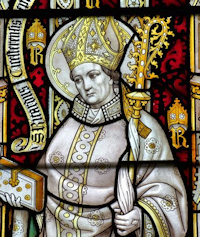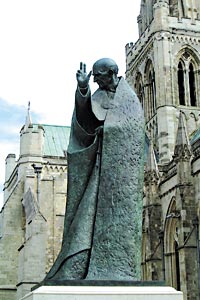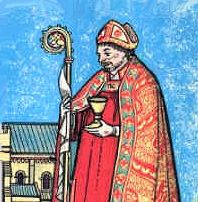Make your gift today!
Help keep Catholics around the world educated and informed.
Already donated? Log in to stop seeing these donation pop-ups.
Easter: April 3rd
Thursday of the Second Week of Easter
Other Commemorations: St. Richard of Chichester, Bishop (RM)
» Enjoy our Liturgical Seasons series of e-books!
"The Father loves the Son and has entrusted everything to Him. Anyone who believes in the Son has eternal life, but anyone who refuses to believe in the Son will never see life: the anger of God stays on him." (Jn 3:35-36)
Meditation - Every Christian Life, to Be an Uninterrupted Easter Joy
Pray that you may look upon a typically Christian interior life as a celebration of the magnificent Crucifixion-Resurrection victory of Christ Jesus. Let it be for you an uninterrupted harmonization of two experiences, as opposite and seemingly incompatible as cross and joy.
Through the instructions of Jesus to His Apostles and also through the exhortations of the Apostles to their converts, there sounds, like a dominant note, the insistence that every trial and suffering of Christians is positively designed to be so illuminated by rays of Easter light that all natural darkness and bitterness will be transformed into brightness and sweetness. This does not mean that even the most perfect Christian faith will entirely deaden bodily pains and heartaches and soul sorrows. With only rarest exceptions, our sufferings come to us and are left with us to be felt, and our crosses are to be borne as stern realities. Jesus Himself insists that we shall have sorrow and have reason to lament and weep. (John 16). And though St. Paul thrice besought Him that the angel of Satan might be made to depart form him, Jesus who loved him as a vessel of His election answered: "My grace is sufficient for thee!" Yes, pains and sorrows remain; but through them all, even while experiencing extraordinary tribulation, there is to abide within our soul the anticipated Resurrection peace and joy that reigns in imperturbably Christian hope (2 Cor. 6; 8; 11; 12). — Our Way to the Father by Rev. Leo M. Krenz, S.J.
St. Richard of Chichester
 St. Richard was born in 1197 at Wiche, near Worcester, England. When quite young, he and his elder brother were left orphans. Richard gave up his studies in order to manage his brother's impoverished farms. He succeeded so well that his brother desired to make over the estate to him. Richard refused not only the estate, but the opportunity of a brilliant marriage, since he desired to give himself to God's service. He resumed his studies which he had begun at Oxford, then in Paris. Returning to England he won his Master of Arts at Oxford, and then went to Bologna, Italy, to study canon law.
St. Richard was born in 1197 at Wiche, near Worcester, England. When quite young, he and his elder brother were left orphans. Richard gave up his studies in order to manage his brother's impoverished farms. He succeeded so well that his brother desired to make over the estate to him. Richard refused not only the estate, but the opportunity of a brilliant marriage, since he desired to give himself to God's service. He resumed his studies which he had begun at Oxford, then in Paris. Returning to England he won his Master of Arts at Oxford, and then went to Bologna, Italy, to study canon law.
St. Edmund, Archbishop of Canterbury, appointed him his Chancellor, and he accompanied the Archbishop when he was banished to France. After his death, Richard retired to a convent of Dominican Friars in Orleans, France, where he was ordained Priest.
When Bishop Nevil of Chichester, England, was dying, King Henry III recommended an unworthy court favorite to the See. The Archbishop declared him unqualified and the presentation void. He preferred Richard of Wiche to that dignity. Richard was consecrated in 1245, but the King refused to recognize the election and seized the revenues of the See. Richard suffered many hardships and persecutions for two years, repaying with favors those who persecuted him. He pleaded his cause before Pope Innocent IV against the King's deputies, and obtained a confirmation of his election.
 St. Richard performed his episcopal duties with fervor and charity towards his flock, and thoroughly reformed his See. After two years his revenues were restored. He preached the word of God with that unction and fruitfulness which only an eminent spirit of prayer could produce. Penitent sinners he received with great tenderness and charity, but when the rights of the Church were questioned he remained obdurate, fearing no consequences.
St. Richard performed his episcopal duties with fervor and charity towards his flock, and thoroughly reformed his See. After two years his revenues were restored. He preached the word of God with that unction and fruitfulness which only an eminent spirit of prayer could produce. Penitent sinners he received with great tenderness and charity, but when the rights of the Church were questioned he remained obdurate, fearing no consequences.
While preaching a holy war against the Saracens, at the Pope's command, St. Richard fell ill. He foretold his death, dying in a hospital at Dover on April 3, 1253, at the age of fifty-six. His body was conveyed to Chichester for internment in the Cathedral before the altar he had erected. Miraculous cures occurred at his tomb. The Saint was solemnly canonized by Pope Urban IV in 1262.
—From Heavenly Friends: A Saint for Each Day by Rosalie Marie Levy
Patronage: coachmen; Sussex, England; city of Chichester, England; diocese of Chichester
Symbols and Representation: bishop with a chalice on its side at his feet because he once dropped the chalice during a Mass and nothing spilled from it; kneeling with the chalice before him; ploughing his brother’s fields; a bishop blessing his flock with a chalice nearby
Highlights and Things to Do:
- Read more about St. Richard:
- Chichester Cathedral had a shrine dedicated to St. Richard and was a center of pilgrimage. In 1538, during the reign of Henry VIII, the shrine was plundered and destroyed by order of Thomas Cromwell. See this site for more details about St. Richard's relics.
- Richard of Chichester is the patron saint of Sussex in southern England; since 2007, his translated saint's day of June 16 has been celebrated as Sussex Day.
- The prayer from which the Hymn "Day by Day" takes its lyrics is attributed to St. Richard:
Thanks be to my Lord Jesus Christ
for all the benefits thou hast given me,
for all the pains and insults thou hast borne for me.
O most merciful redeemer, friend and brother,
may I know thee more clearly,
love thee more dearly
and follow more nearly.






